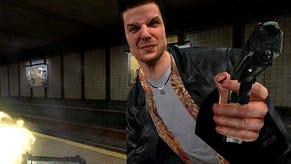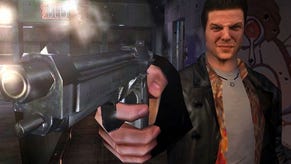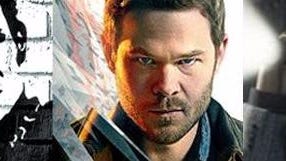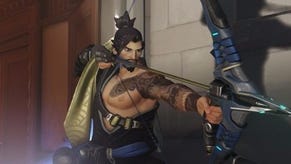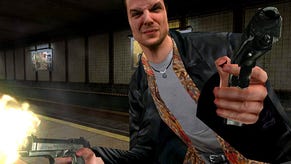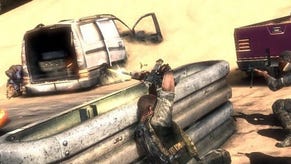Max Payne
I've got a bit of a Payne in my hand...
More than ten million GBA handhelds have been sold on this continent; more than three million of which were cast from the superior SP mould. Despite this, there are surprisingly few true adult games available on the platform. Oh there are enough, sure - we've had two Castlevania games (now with Visible Graphics Technology), two Advance Wars titles, a pair of Golden Suns and Final Fantasy Tactics Advance - but traditionally publishers and developers have recoiled at the very prospect of telling grown up stories, pumping primary colours, disappearing corpses and toonish innocence into the crimson vacuum of so-called action games.
The Rise of Max Payne
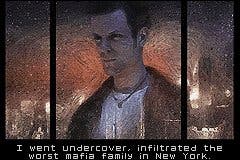
Not so Max Payne developer Mobius. Theirs is a game where enemies groan, blood gushes and splatters walls, heroes and villains are no more virtuous than one another, and nobody lives happily ever after. In fact, virtually nobody survives at all - good or bad, major characters are like ants in the sun under a roving spyglass; crimson geysers eager to stain the beautifully drawn comic cell story sequences at every turn, and anti-hero Max spends most of the game getting shot, blown up, mown down and even drugged up on his way to revenge.
It's difficult to imagine that anybody missed the PC original or its subsequent console ports (however poor they may have been by comparison). Max Payne had its critics, but ultimately it raised the bar for third-person action games, giving us our first taste of Bullet Time - slowed down gunplay, for those who somehow missed it - and delivering a film noir story full of delightful action movie clichés, poetically narrated, in which gravely anti-hero Max Payne, hot on the heels of a drug conspiracy that killed his wife and baby daughter, wound up wrongly accused of murder and on a spiralling path to vengeance.
Reinventing such an influential title on the Game Boy Advance is no mean feat, and you can understand why Rockstar was perhaps reluctant to let the cat out of the bag until late in the day when they were sure of Mobius' credentials. In fact, the handheld port of the game was only announced a week before it hit store shelves in the USA. As it turns out though Rockstar had nothing to fear, because UK-based Mobius has not only managed to reshape Remedy's slow motion film noir cliché to fit an isometric action game mould, with Bullet Time, comic book storytelling, Max's apathetic commentary and almost every major gameplay event making the journey intact, but it has arguably set the standard for grown up handheld titles at the same time. Quite an achievement, really.
Ye Olde Timely Bullet
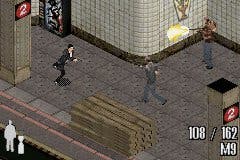
From the title sequence onwards, this is unquestionably Max Payne, with many of the PC/console game's cells reused and digitised dialogue delivered by the same actors. Although a few sacrifices have been made (gone, for example, are the playable prologue, platform-leaping dream sequences and burning building escapade), and the controls take a little getting used to (up takes Max diagonally up and right, down takes him diagonally down and to the left, etc), it captures the spirit of the original masterfully.
It's a compelling game right from the start, as Max dives around an abandoned station pumping criminals full of lead. In the interests of keeping things simple, the PC's separate acts of slow motion and diving have now become one - a single function mapped to the right trigger - which sees Max leap like Boris Becker, his arms twisting and firing in every direction to match each tweak of the directional pad. Within a couple of levels, Max is racing into rooms and dropping several enemies with every dive, securing another burst of slow motion for the Bullet Time hourglass with every kill. Along the way he can top up his health with pain killers, up to eight of which can be stored away to recoup health via the Select button - a curious limitation, really, given his trench coat's capacity for firearms - and besides a few buttons to press and doors to open, that's very much the gist of it. What you get is 12 increasingly difficult and ostensibly linear levels to conquer, and four "Continues" with which to conquer each of them - with a save point and another four continues the prize for success.
Level design is generally consistent, but the difficulty level sometimes soars unexpectedly. Although for the most part the default and solitary "Fugitive" option puts up a fairly meagre fight, allowing this reviewer to trudge through around ten of the game's levels on first inspection, there are a couple of areas that require nothing short of superhuman levels of patience, most notably one of the levels late on, set inside an installation called Cold Steel, which Max rightly suspects is a haven for criminal misdemeanours. It's a tough level anyway by the standards set elsewhere, with enemies respawning when Max falls back on himself, more than capable of stripping the player of the previously optimal four retries, but shortly before the end the difficulty level ramps up from a manageable gradient to the sort of incline that would have Sir Edmund Hillary gasping for breath.
Fire Noir
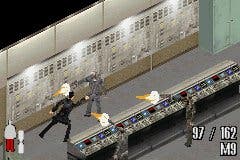
Ironically enough for an adaptation of Max Payne, it's a series of fiery obstacles that puts up a barrier. Imagine, if you will, the pain and frustration of the near-legendary "burning building" section of the PC original faithfully transplanted onto the screen of the GBA, and you will have some idea of how I felt when faced with vents that spew fire in rhythmic bursts. Often obscured somewhat by scenery. Often tightly spaced so that Max has trouble stopping in-between them. And always fatal at the slightest touch.
To be fair though that's a fairly isolated instance, and by the time you come across the same thing on the next level you'll have learned exactly how to tackle them anyway. Indeed, the most troubling thing about the next level is figuring out that you need to pick up a key code from a downed scientist. After that it's more or less plain sailing, as it has been from the start.
Oh but what a lovely way to sail - despite the limitations of the handheld, which even struggles to keep up with the action on occasion, Max's journey through the underbelly of a wintry, crime-infested New York City has been brought to life with a stunning attention to detail. Locations are intricately realised, from the sterile interior of a bank vault to the dusty mantles of a hilltop mansion, with crates and glass that shatter as bullets fly hither and thither. Max and his adversaries are all extremely fluidly animated, with the sole death animation in particular more than satisfying - and well done Mobius for sticking to one basic but extremely rewarding vision of that demise, too, given how crucial a visual indicator it becomes during pitched battles.
Aurally too the game is a revelation amongst the tinny, incoherent ranks of Game Boy effects, with a wide array of crunchy weapon noises certain to capture the attention of anybody else on your bus or train, and Max's gravely tones delivered remarkably clearly by the GBA's limited sound hardware. This is definitely a game worth listening to - even the bongo tunes quickly work their way into your skull.
Not Suitable For Kids
Unfortunately though, like so many other GBA titles, Max Payne is desperately short. Even if you get caught up in Cold Steel for an hour or so as I did, you can still expect to vanquish your enemies in a final rooftop showdown inside five hours. Despite the prospect beyond that of Dead On Arrival and New York Minute difficulty levels, and an array of toggleable Cheats in the options menu, there really is little reason to stroll back through New York a second or third time. And besides, when the curtain fell I was more than happy to turn my back on Bullet Time for another few weeks, particularly when it dawned on me that that's literally all there is to it - combat is next to impossible without utilising slow motion, and stripped of its narrative enticement the second time through the game feels rather empty under reappraisal. Which is also something to consider if you know the original inside and out...
That said though, overall Max Payne is an undeniably alluring little isometric shoot-'em-up with some tolerable flaws, and if, like me, you plan to get stuck into the PC sequel in the near future, then it offers a succinct and vital refresher of key plot points. It's also one of relatively few truly adult games available on the handheld, and ultimately for managing to deliver on the original's grown up premise without resorting to spud guns, fluffy clouds or the charmless template of a side-on shoot-'em-up, Mobius more than deserves the plaudits.


